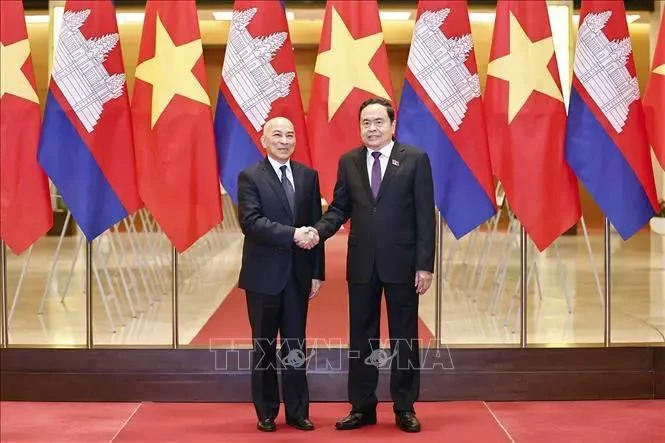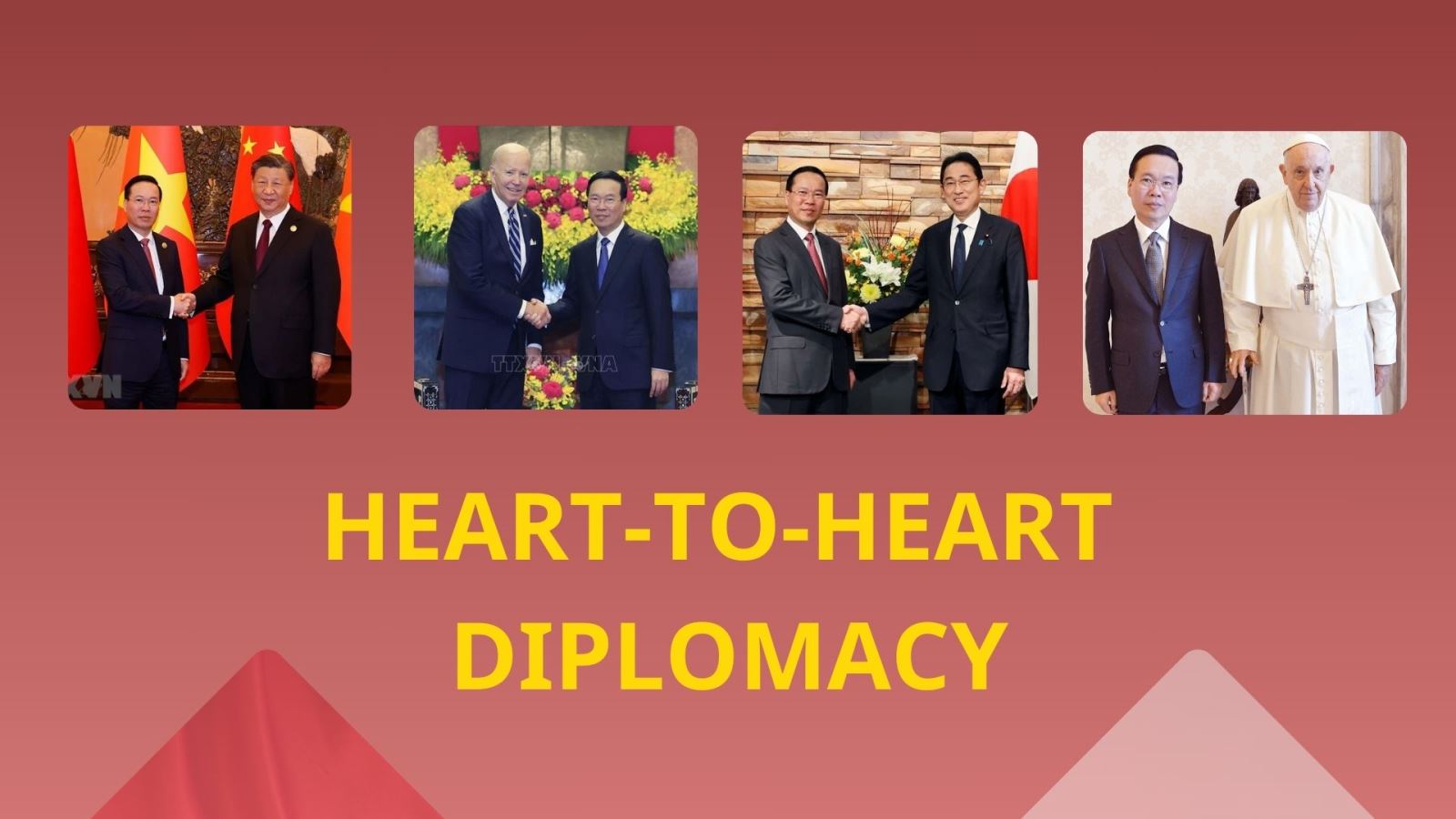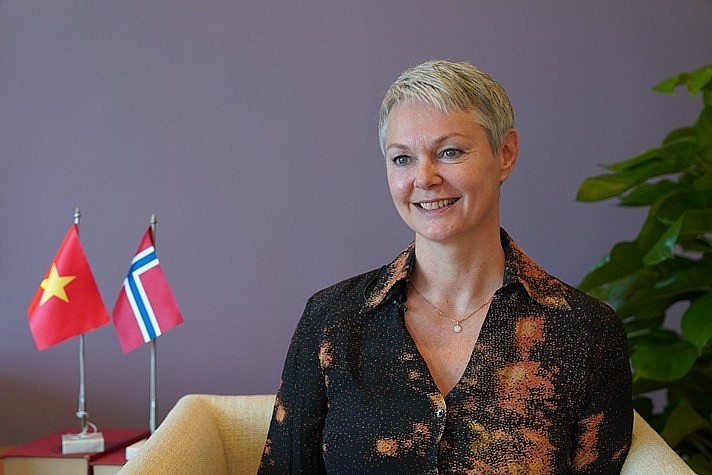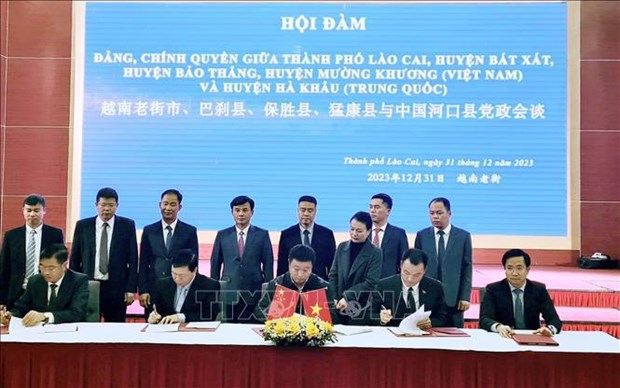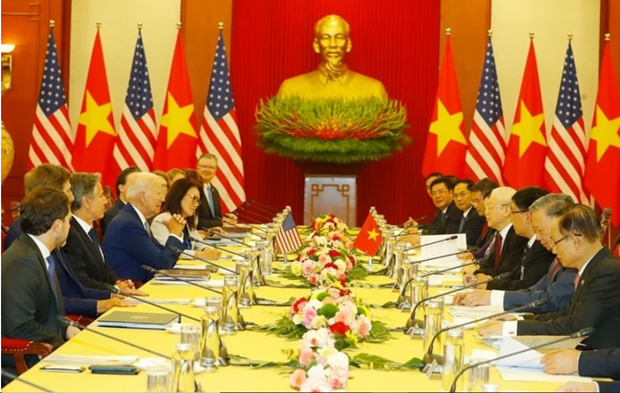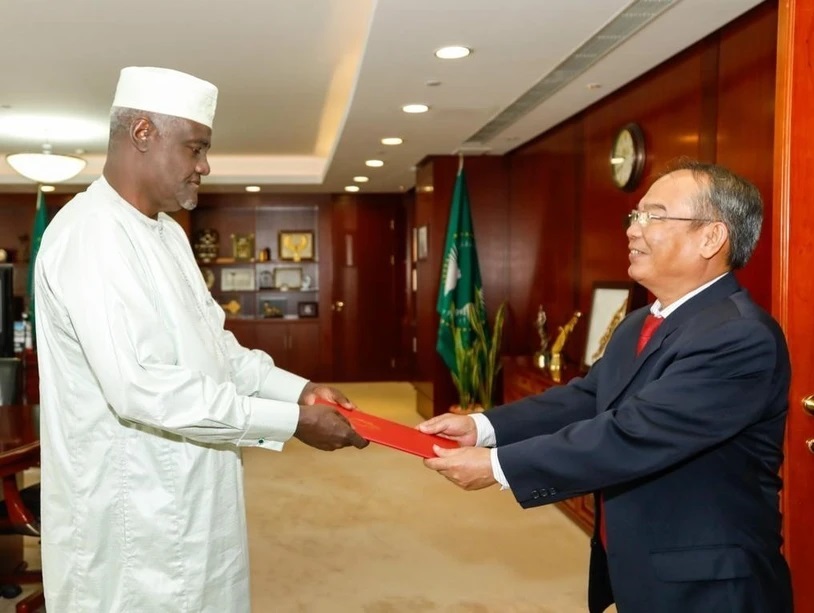PM Pham Minh Chinh speaks at the fourth Mekong - Lancang Cooperation (MLC) Leaders’ Meeting via videoconference on December 25. (Photo: VNA)
The PM made the statement while addressing the fourth MLC Leaders’ Meeting held via videoconference on December 25. The event was attended by the PMs and heads of the delegations of Cambodia, Laos, Myanmar, Thailand, China, and Vietnam.
Participants reviewed the MLC results over the last three years since the third meeting held in August 2020, and discussed orientations for the time ahead.
In his speech, PM Chinh emphasised that the MLC has become an important mechanism connecting the Mekong countries and China, and also a model of working together for common development and win-win cooperation.
Over its seven years of development, the MLC has obtained outstanding achievements, he noted, elaborating that this cooperation mechanism has been increasingly perfected, its content has become more and more substantive, and the friendship and mutual understanding among people of the six countries have been further intensified.
The Government leader of Vietnam held that in the face of fast and profound changes in the world’s economy, to strongly move forward, the six MLC countries should adopt a more comprehensive mindset, a people-based, regional and global approach, along with new, drastic, creative, and breakthrough solutions.
Proposing three priorities for the MLC in the coming period, PM Chinh said that first, the countries should build a Mekong - Lancang region of modernity and development with resources unleashed, mobilised, and effectively used; optimise potential and strengths of each country and all the six; and view their internal strength as the fundamental and strategic factor while external resources as an important and breakthrough one.
The focal task is to promote the industrialisation, modernisation, and building of independent and self-reliant economies for the MLC countries in tandem with active, extensive, substantive, and effective integration into the world, he continued.
The MLC should turn innovation and science - technology into a cooperation focus in which the countries should support fundamental industries, gradually shift from processing and assembly to researching, designing and manufacturing, and apply new technology to industrial and agricultural production. The countries need to step up digital transformation via partnerships in digital infrastructure, digital human resources, digital security, and digital economy. They should encourage the participation of development partners and businesses in the spirit of “harmonising interests and sharing risks”. It is also necessary to boost transport cooperation, especially high-speed railway connectivity, and consider a mechanism for making payments in their national currencies, he opined.
Second, the PM noted, the countries should develop a green, sustainable, and inclusive Mekong - Lancang region that ensures the harmony between the present and the future as well as between economic growth and environmental protection; puts people at the centre and views people as the key stakeholder, momentum, resource, and target of development; and leaves no one behind.
The immediate priority should be given to assisting the countries to realise the UN’s Sustainable Development Goals, the Paris Agreement on climate change, and the commitments to reducing carbon emissions to build green and circular economies. It is important to enhance regional cooperation in protecting the environment; responding to natural disasters; managing and efficiently, sustainably, equitably, and reasonably using the Mekong - Lancang River; and especially not changing the river’s natural flows.
To secure a better future for people, the six countries need to proritise investment for developing humans, building inclusive education and health systems, assisting the young workforce to access science and technology, and creating conditions for all people to benefit from the development process, according to the PM.
The third priority is to build a Mekong - Lancang region of peace and cooperation, he said, adding that the six countries should unceasingly strengthen their mutual trust, sincerity, solidarity, and consensus, promote common interests, and uphold multilateralism. They need to enhance the MLC’s complementarity with the Association of Southeast Asian Nations (ASEAN) and other regional and sub-regional cooperation mechanisms to optimise resources to boost common benefits.
PM Chinh affirmed support for Laos to successfully hold the ASEAN chairmanship in 2024 and also pointed out the need to give higher priority to cultural cooperation and people-to-people exchanges, especially among their younger generations.
Concluding the meeting, the leaders adopted the Nay Pyi Taw Declaration, the MLC plan of action for 2023-2027, and the initiative on the Mekong - Lancang innovation corridor./.
Participants reviewed the MLC results over the last three years since the third meeting held in August 2020, and discussed orientations for the time ahead.
In his speech, PM Chinh emphasised that the MLC has become an important mechanism connecting the Mekong countries and China, and also a model of working together for common development and win-win cooperation.
Over its seven years of development, the MLC has obtained outstanding achievements, he noted, elaborating that this cooperation mechanism has been increasingly perfected, its content has become more and more substantive, and the friendship and mutual understanding among people of the six countries have been further intensified.
The Government leader of Vietnam held that in the face of fast and profound changes in the world’s economy, to strongly move forward, the six MLC countries should adopt a more comprehensive mindset, a people-based, regional and global approach, along with new, drastic, creative, and breakthrough solutions.
Proposing three priorities for the MLC in the coming period, PM Chinh said that first, the countries should build a Mekong - Lancang region of modernity and development with resources unleashed, mobilised, and effectively used; optimise potential and strengths of each country and all the six; and view their internal strength as the fundamental and strategic factor while external resources as an important and breakthrough one.
The focal task is to promote the industrialisation, modernisation, and building of independent and self-reliant economies for the MLC countries in tandem with active, extensive, substantive, and effective integration into the world, he continued.
The MLC should turn innovation and science - technology into a cooperation focus in which the countries should support fundamental industries, gradually shift from processing and assembly to researching, designing and manufacturing, and apply new technology to industrial and agricultural production. The countries need to step up digital transformation via partnerships in digital infrastructure, digital human resources, digital security, and digital economy. They should encourage the participation of development partners and businesses in the spirit of “harmonising interests and sharing risks”. It is also necessary to boost transport cooperation, especially high-speed railway connectivity, and consider a mechanism for making payments in their national currencies, he opined.
Second, the PM noted, the countries should develop a green, sustainable, and inclusive Mekong - Lancang region that ensures the harmony between the present and the future as well as between economic growth and environmental protection; puts people at the centre and views people as the key stakeholder, momentum, resource, and target of development; and leaves no one behind.
The immediate priority should be given to assisting the countries to realise the UN’s Sustainable Development Goals, the Paris Agreement on climate change, and the commitments to reducing carbon emissions to build green and circular economies. It is important to enhance regional cooperation in protecting the environment; responding to natural disasters; managing and efficiently, sustainably, equitably, and reasonably using the Mekong - Lancang River; and especially not changing the river’s natural flows.
To secure a better future for people, the six countries need to proritise investment for developing humans, building inclusive education and health systems, assisting the young workforce to access science and technology, and creating conditions for all people to benefit from the development process, according to the PM.
The third priority is to build a Mekong - Lancang region of peace and cooperation, he said, adding that the six countries should unceasingly strengthen their mutual trust, sincerity, solidarity, and consensus, promote common interests, and uphold multilateralism. They need to enhance the MLC’s complementarity with the Association of Southeast Asian Nations (ASEAN) and other regional and sub-regional cooperation mechanisms to optimise resources to boost common benefits.
PM Chinh affirmed support for Laos to successfully hold the ASEAN chairmanship in 2024 and also pointed out the need to give higher priority to cultural cooperation and people-to-people exchanges, especially among their younger generations.
Concluding the meeting, the leaders adopted the Nay Pyi Taw Declaration, the MLC plan of action for 2023-2027, and the initiative on the Mekong - Lancang innovation corridor./.
Q.Hoa t.h / VNA




